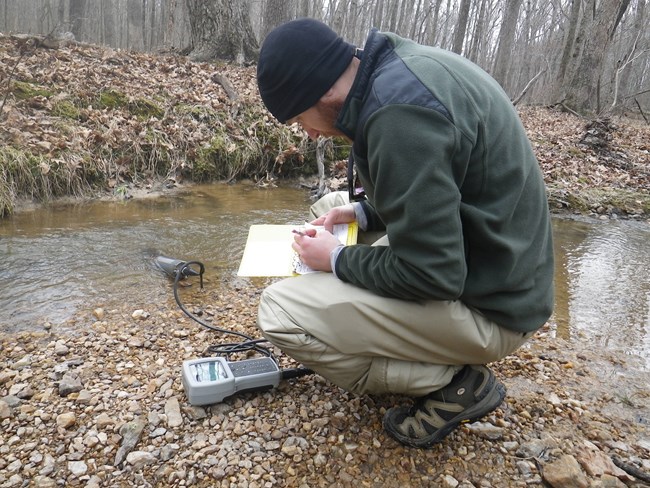
NPS / Nathan Dammeyer
Importance and Issues
Water chemistry has ecological significance because the chemical composition (including nutrient content) of surface water is a critical attribute of aquatic habitats and an integrator of hydro-biogeochemical conditions and processes occurring throughout associated watersheds. The data obtained through water chemistry monitoring thus serve to indicate current and changing ecological conditions in both surface waters and watersheds.
Water chemistry has management and policy significance because the National Park Service (NPS) is legally required to protect pristine water quality and improve impaired water quality. Streams and rivers managed by the NPS must meet State and Federal water quality criteria as defined by the Clean Water Act (CWA). In addition, the NPS is required by the Government Performance and Reporting Act (GPRA) to establish and evaluate attainment of goals for meeting water quality criteria.
Monitoring Objectives
- Determine status of core water quality parameters (temperature, pH, dissolved oxygen, specific conductance) in selected wadeable streams (1st-5th order) and report to State-based regulatory agencies for assessment of adherence to Clean Water Act standards.
- Determine seasonal and long-term trends in core water quality parameters in MIDN wadeable streams.
- Relate water quality status and trends to physical habitat and benthic macroinvertebrate data to gain a broad understanding of ecological conditions in MIDN wadeable streams.
Where We Monitor
- Appomattox Court House National Historical Park
- Booker T. Washington National Monument
- Eisenhower National Historic Site
- Fredericksburg & Spotsylvania National Military Park
- Gettysburg National Military Park
- Hopewell Furnace National Historic Site
- Petersburg National Battlefield Park
- Richmond National Battlefield
- Valley Forge National Historical Park
Monitoring Documents
Resource briefs are short PDFs summarizing our monitoring programs or results.
Source: NPS DataStore Saved Search 686. To search for additional information, visit the NPS DataStore.
Periodically, we publish reports that describe what we are learning in the field. These monitoring reports are more in-depth than resource briefs and include data analysis and a discussion of our findings.
Source: NPS DataStore Saved Search 699. To search for additional information, visit the NPS DataStore.
Protocols describe how we monitor. They include a descriptive narrative of what we monitor and why, our field methods, how we analyze and manage our data, and more. All of our protocols are peer reviewed.
Source: NPS DataStore Saved Search 709. To search for additional information, visit the NPS DataStore.
Source: NPS DataStore Saved Search 5795. To search for additional information, visit the NPS DataStore.
For More Information
Contact Nathan Dammeyer, Mid-Atlantic Network Ecologist
Last updated: March 19, 2025
